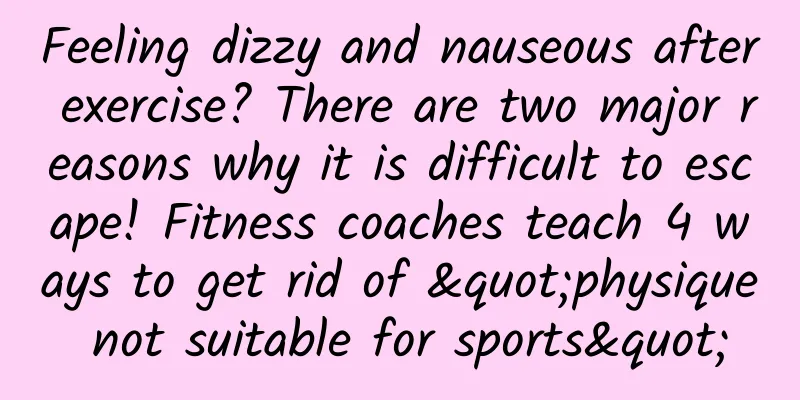Feeling dizzy and nauseous after exercise? There are two major reasons why it is difficult to escape! Fitness coaches teach 4 ways to get rid of "physique not suitable for sports"

|
Some office workers who have no exercise habits experience dizziness and nausea after exercise, so they conclude that they are "not suitable for exercise." Fitness coach Li Zheyu said that for novice athletes, dizziness and vomiting are common problems, but as long as you implement the four principles in your daily life, you don't have to worry about side effects ruining your interest in exercise. Two major reasons for dizziness after exercise: intense exercise, fasting exerciseSports and fitness are popular. Many office workers put on sports shoes after get off work or on holidays, join group road running, or go to the fitness center to do aerobics, pedal flywheel or do weight training, but many of them will have the trouble of dizziness and vomiting after exercise! Li Zheyu, a fitness coach, said that there are two main reasons for feeling dizzy and nauseous after exercise: the first is "lack of exercise in daily life and doing strenuous exercise when you move", and the second is "fasting for too long or eating too little before exercise". Intense exercise and rapid breathing can lead to hypoxiaThe first situation is most common among sedentary people who have no exercise habits in the past. They "overdo" when they start exercising, doing high-intensity exercise or constantly training their leg strength, which results in hypoxia in the body or a sudden drop in blood sugar, leading to dizziness and vomiting. In addition, people who use the holidays to repay their "exercise debt" and concentrate on training for a week's worth of exercise on their days off are also prone to physical discomfort due to sudden intense or excessive exercise. Overdoing it when you start exercising, doing high-intensity exercise or constantly training your leg strength, can result in oxygen deprivation in the body or a sudden drop in blood sugar, leading to dizziness and nausea. Coach Li Zheyu pointed out that if you usually do very little exercise and then do strenuous exercise, your heart rate will suddenly accelerate and your cardiovascular system will expand rapidly. Not only will the human body be unable to adapt, causing an imbalance in the body's electrolytes, water and sugar-breaking mechanisms, but the body will also lack oxygen due to rapid breathing, and insufficient time for carbon dioxide to be converted in the body, which can easily lead to hypoxia and dizziness. If you hold your breath while doing weight training, you may feel like vomiting. Exercise on an empty stomach can easily trigger hypoglycemiaAs for "fasting for too long or eating too little before exercise", the direct impact is that it will cause blood sugar to drop. When a person's blood sugar level is too low, they are prone to symptoms such as dizziness, headache, vomiting, and weakness. In addition, when doing lower limb exercises, blood will be concentrated in the lower body and difficult to flow back to the upper body. If you do not eat or only eat a little before exercise, the upper body and brain will lack nutrients and oxygen brought by blood circulation, which can easily lead to symptoms of dizziness and vomiting. "Fasting for too long or eating too little before exercise" will directly cause blood sugar to drop. When a person's blood sugar level is too low, they are prone to symptoms such as dizziness, headache, vomiting, and weakness. 4 tips to prevent dizziness and vomiting after exerciseTo overcome the problem of dizziness and vomiting after exercise, coach Li Zheyu emphasized that you must grasp the four principles of healthy exercise: 1. Develop a habit of regular exercise, and increase the intensity of exercise gradually, and do not overdo it. 2. Warm up thoroughly before exercise to allow the body to gradually enter the exercise state. 3. Avoid exercising on an empty stomach. Eat a fist-sized amount of high-GI food, such as a banana or a piece of bread, one hour before exercise to quickly replenish energy and prevent hypoglycemia during exercise. 4. Learn how to maintain normal breathing during exercise, especially when doing weight training, do not hold your breath. Holding your breath can easily cause hypoxia in the body and cause dizziness and discomfort. |
Recommend
How to correctly diagnose endometrial tuberculosis
In daily life, we need to be alert to the occurre...
What are the different types of vaginitis?
There is not just one type of vaginitis. There ar...
How to avoid uterine fibroids
How to avoid the attack of uterine fibroids? The ...
Is bacterial vaginosis contagious?
Is bacterial vaginosis contagious? The answer is ...
What is the reason for not having menstruation for more than a month after abortion?
The absence of menstruation for more than a month...
Is a Bartholin's gland cyst contagious?
Are Bartholin's gland cysts contagious? Barth...
Experts tell you the bad habits that induce cervicitis
In real life, some bad living habits are common c...
What are the precautions for preventing cervicitis?
Cervicitis is one of the common gynecological dis...
Keeping your bowels open can prevent dysmenorrhea
Dysmenorrhea makes many women suffer great pain. ...
Do some muscle exercises before running! Better fat burning effect
Running is one of the most effective exercises fo...
What are the effective preventive measures for ectopic pregnancy?
Nowadays, more and more pregnant women suffer fro...
What are the best ways to treat menopause?
Menopause is a natural process that all women hav...
What fruits are afraid of uterine fibroids?
The fruits that uterine fibroids are afraid of re...
What is the cure rate for habitual abortion?
I believe many female friends are familiar with t...
Whole grains are rich in dietary fiber, which can provide a strong sense of satiety and help lose weight
[Key Points]: Whole grains are good for weight lo...









